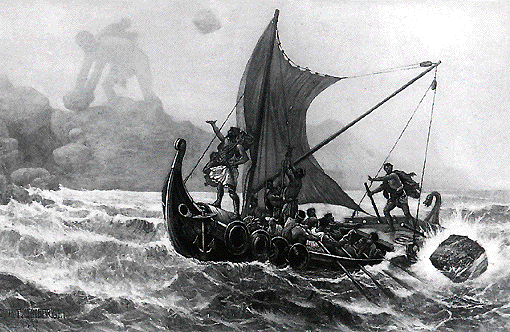Hey everyone, I am currently reading Paradise Lost by Milton for my English class. I've been meaning to read this epic for awhile but I just haven't been able to. The only reason I took this English class was because Paradise Lost was part of the curriculum. I've read The Odyssey many times and I finished the Divine Comedy in my freshman year of college. The Odyssey still remains my favorite epic though with the Divine Comedy my second favorite. So I was wondering, IWC, what is your favorite epic of all time?



The Odyssey (Greek: Ὀδύσσεια, Odýsseia) is one of two major ancient Greek epic poems attributed to Homer. It is, in part, a sequel to the Iliad, the other work traditionally ascribed to Homer. The poem is fundamental to the modern Western canon. Indeed it is the secondthe Iliad being the firstextant work of Western literature. It was probably composed near the end of the eighth century BC, somewhere in Ionia, the Greek-speaking coastal region of what is now Turkey.
The poem mainly centers on the Greek hero Odysseus (or Ulysses, as he was known in Roman myths) and his long journey home following the fall of Troy. It takes Odysseus ten years to reach Ithaca after the ten-year Trojan War. In his absence, it is assumed he has died, and his wife Penelope and son Telemachus must deal with a group of unruly suitors, the Mnesteres (Greek: Μνηστῆρεςor Proci, competing for Penelope's hand in marriage.
It continues to be read in the Homeric Greek and translated into modern languages around the world. The original poem was composed in an oral tradition by an aoidos (epic poet/singer), perhaps a rhapsode (professional performer), and was intended more to be sung than read. The details of the ancient oral performance, and the story's conversion to a written work inspire continual debate among scholars. The Odyssey was written in a regionless poetic dialect of Greek and comprises 12,110 lines of dactylic hexameter.
Among the most impressive elements of the text are its strikingly modern non-linear plot, and that events seem to depend as much on the choices made by women and serfs as on the actions of fighting men. In the English language as well as many others, the word odyssey has come to refer to an epic voyage.

The Divine Comedy (Italian: La Divina Commedia) is an epic poem written by Dante Alighieri between 1308 and his death in 1321. It is widely considered the preeminent work of Italian literature, and is seen as one of the greatest works of world literature.
The poem's imaginative and allegorical vision of the Christian afterlife is a culmination of the medieval world-view as it had developed in the Western Church. It helped establish the Tuscan dialect in which it is written as the Italian standard. It is divided into three parts, the Inferno, Purgatorio, and Paradiso.
On the surface the poem describes Dante's travels through Hell, Purgatory, and Heaven; but at a deeper level it represents allegorically the soul's journey towards God. At this deeper level, Dante draws on medieval Christian theology and philosophy, especially the teachings of Thomas Aquinas. At the surface level, the poem is understood to be fictional.

Paradise Lost is an epic poem in blank verse by the 17th-century English poet John Milton. It was originally published in 1667 in ten books, with a total of over ten thousand individual lines of verse. A second edition followed in 1674, redivided into twelve books (in the manner of the division of Virgil's Aeneid) with minor revisions throughout and a note on the versification; the majority of the poem was written while Milton was blind, and was transcribed for him.
The poem concerns the Christian story of the Fall of Man: the temptation of Adam and Eve by the fallen angel Satan and their expulsion from the Garden of Eden. Milton's purpose, stated in Book I, is to "justify the ways of God to men" and elucidate the conflict between God's eternal foresight and free will.
Milton incorporates Paganism, classical Greek references, and Christianity within the poem. It deals with diverse topics from marriage, politics (Milton was politically active during the time of the English Civil War), and monarchy, and grapples with many difficult theological issues, including fate, predestination, the Trinity, and the introduction of sin and death into the world, as well as angels, fallen angels, Satan, and the war in heaven.
Milton draws on his knowledge of languages, and diverse sources primarily Genesis, much of the New Testament, the deuterocanonical Book of Enoch, and other parts of the Old Testament. Milton's epic is generally considered one of the greatest literary works in the English language.

